European cities have begun lifting lockdown restrictions for business after months of quarantine, but scenes taking place across the continent depict a “new normal” that would have seemed alien to people in pre-coronavirus Europe.
On Monday, Italy began to ease its lockdown measures, some two months after the country became the epicentre for the coronavirus in Europe. Italians were finally allowed to frequent cafes, restaurants, shops, and bars after months of quarantine.
Prime Minister Giuseppe Conte said that the country had to accept the risk that coronavirus cases may spike again, or Italy would not recover economically.
“We’re facing a calculated risk in the knowledge that the contagion curve may rise again,” said Conte.
“We have to accept it otherwise we will never be able to start up again,” he added.
The scenes that unfolded on the first day were markedly different than pre-coronavirus Italy. Socially-distanced gondola rides in Venice, makeshift plexiglass pod-style restaurant seating in Milan, and masked hairdressers in Rome were all witnessed on Monday.
The Chief Executive of Milan’s Rinascente department store, Pierluigi Cocchini, told the Evening Standard that his store will be taking extra precautions in opening up. Guards will track the number of customers in the store at a time through an app, and clothes that were tried on in changing rooms will be quarantined for a day before being restocked on the shelves.
“It won’t be business as usual given all the protocols, but this is the new normal for now and we have to accept it,” Chocchini said.
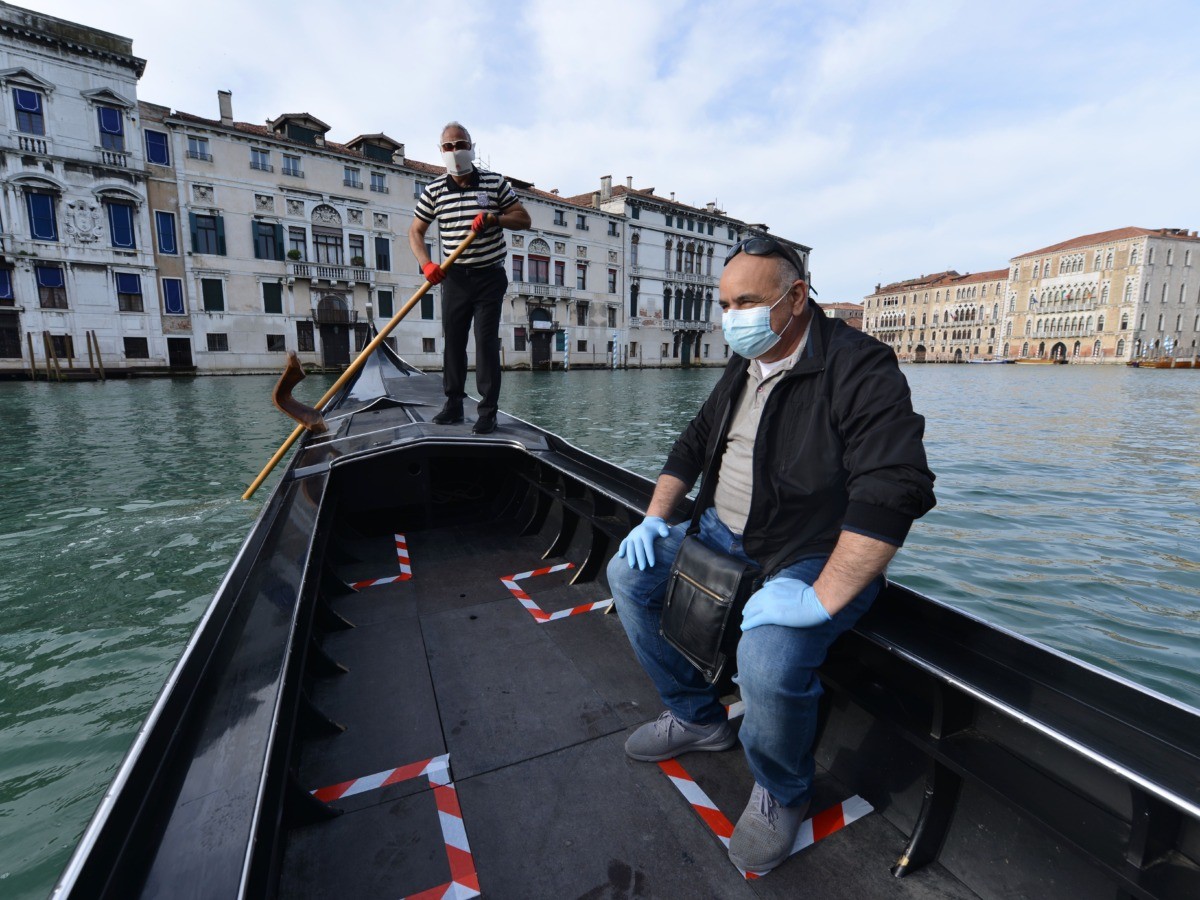
A gondolier (Rear) wearing a face mask resumes service on a Venice canal on May 18, 2020 during the country’s lockdown aimed at curbing the spread of the COVID-19 infection, caused by the novel coronavirus. – Restaurants and churches reopen in Italy on May 18, 2020 as part of a fresh wave of lockdown easing in Europe and the country’s latest step in a cautious, gradual return to normality, allowing businesses and churches to reopen after a two-month lockdown. (Photo by ANDREA PATTARO / AFP) (Photo by ANDREA PATTARO/AFP via Getty Images)

People have lunch at a table partitioned with plexiglass at the Goga Cafe on May 18, 2020 in central Milan during the country’s lockdown aimed at curbing the spread of the COVID-19 infection, caused by the novel coronavirus. – Restaurants and churches reopen in Italy on May 18, 2020 as part of a fresh wave of lockdown easing in Europe and the country’s latest step in a cautious, gradual return to normality, allowing businesses and churches to reopen after a two-month lockdown. (Photo by Miguel MEDINA / AFP) (Photo by MIGUEL MEDINA/AFP via Getty Images)
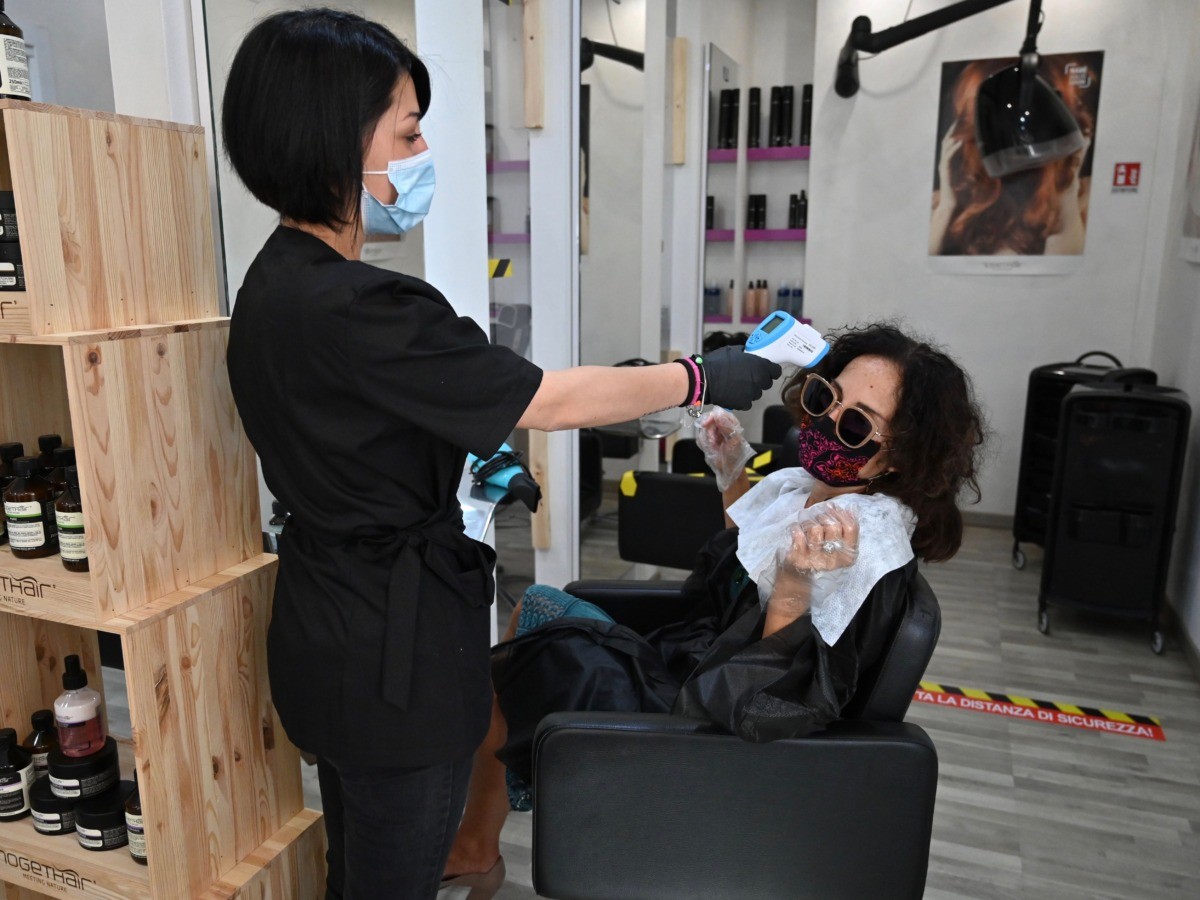
A woman undergoes a body temperature scanning at a hairdresser’s saloon in Rome on May 18, 2020 during the country’s lockdown aimed at curbing the spread of the COVID-19 infection, caused by the novel coronavirus. – Restaurants and churches reopen in Italy on May 18, 2020 as part of a fresh wave of lockdown easing in Europe and the country’s latest step in a cautious, gradual return to normality, allowing businesses and churches to reopen after a two-month lockdown. (Photo by ANDREAS SOLARO / AFP) (Photo by ANDREAS SOLARO/AFP via Getty Images)
Hairdressers, in particular, have been given strict guidelines by the Italian government, which has banned the reading of magazines and said that it is advisable to “hold conversations with the customer through the mirror and carry out the procedures while remaining behind the customer in all possible circumstances”.
Elsewhere in Europe, Ireland has begun opening up its golf courses and garden centres. Health Minister Simon Harris said that if the country can get the next three weeks right, “we as a country will find a way to live safely alongside the virus.”
Greece, meanwhile, has opened the Acropolis and other archaeological sites to the public, with stickers and glass barriers separating tourists. Spain and Portugal have both begun easing lockdown restrictions as well.
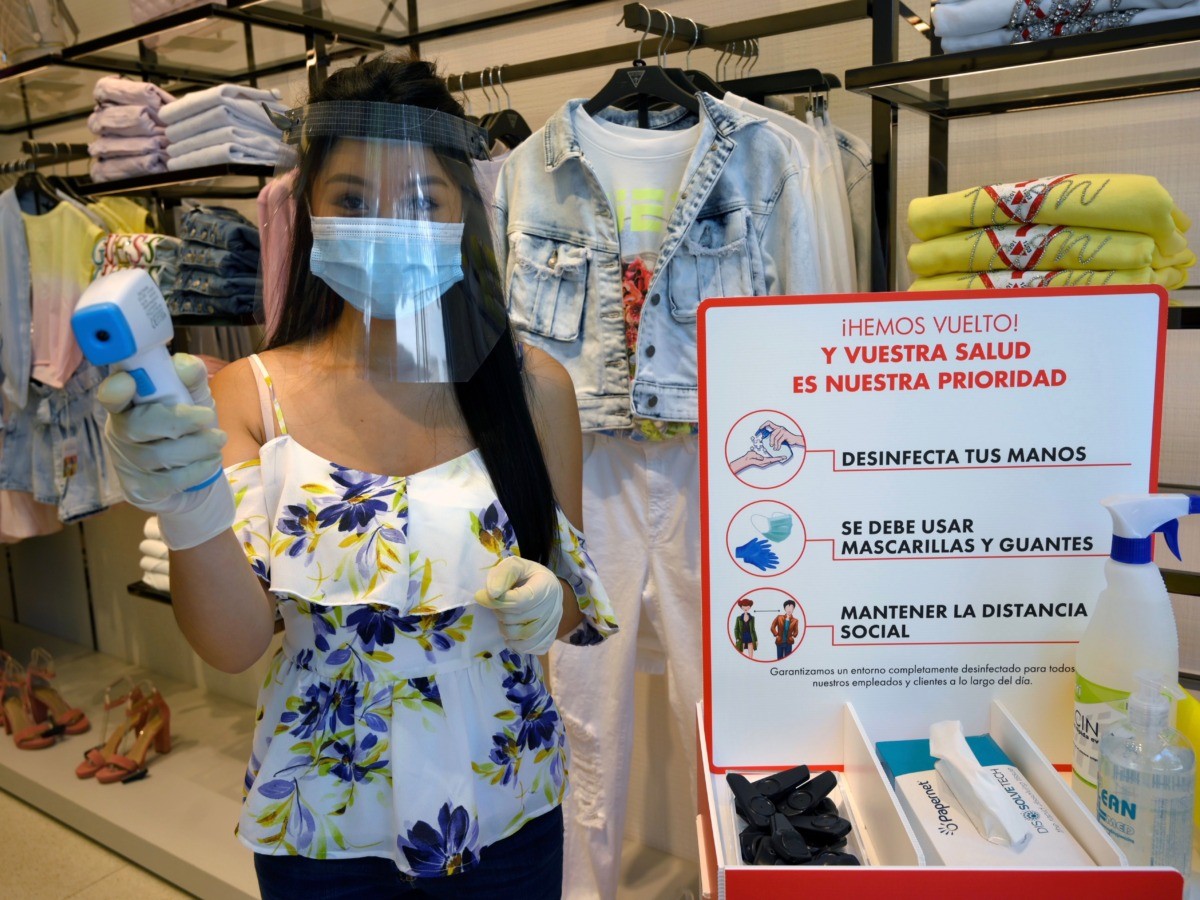
An employee wearing a face shield and mask, holds a thermometer inside a clothing store in Barcelona, on May 18, 2020, amid a national lockdown to fight the spread of the COVID-19 coronavirus. – Spain began last week a three-phase plan to end lockdowns for half the country by the end of June. The lockdown measures initially imposed were among the strictest in Europe. (Photo by LLUIS GENE / AFP) (Photo by LLUIS GENE/AFP via Getty Images)
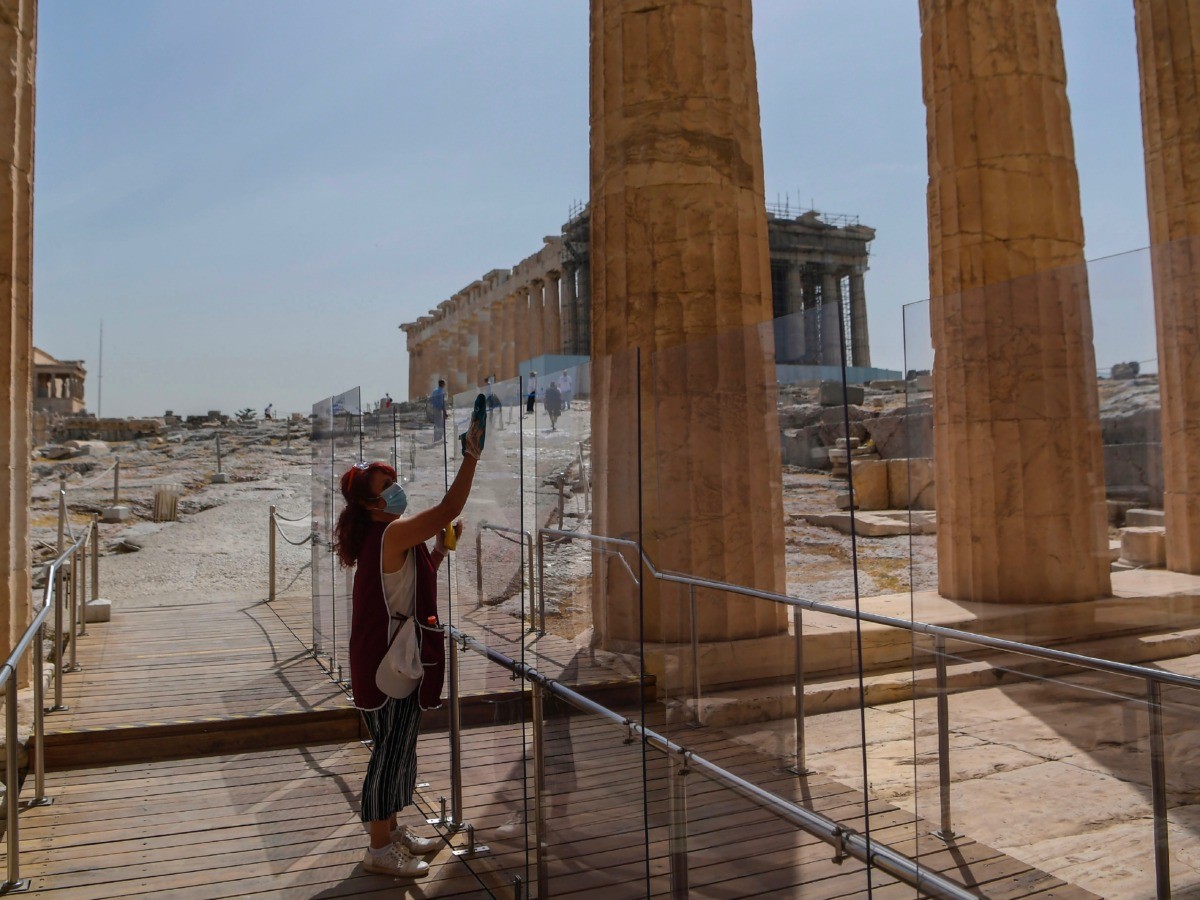
A worker wearing a protective mask cleans a divider made of plexiglass at the entrance of the Acropolis in Athens on May 18, 2020 amid the pandemic of the novel coronavirus (COVID-19). – Greece reopened the Acropolis in Athens and all open-air archaeological sites in the country to the public on May 11 after a two-month closure due to the coronavirus pandemic. (Photo by Aris MESSINIS / AFP) (Photo by ARIS MESSINIS/AFP via Getty Images)

Michael O’Hanlon, wearing a protective visor, smiles as he prepares to play from the first tee at Howth Golf Club in Dublin on May 18, 2020, as golf courses reopen and Ireland cautiously begins to lift it’s coronavirus lockdown. – Ireland launched the first tentative step in its plan to lift coronavirus lockdown on Monday, with staff returning to outdoor workplaces as some shops resumed trade and sports facilities unlocked their doors. (Photo by PAUL FAITH / AFP) (Photo by PAUL FAITH/AFP via Getty Images)
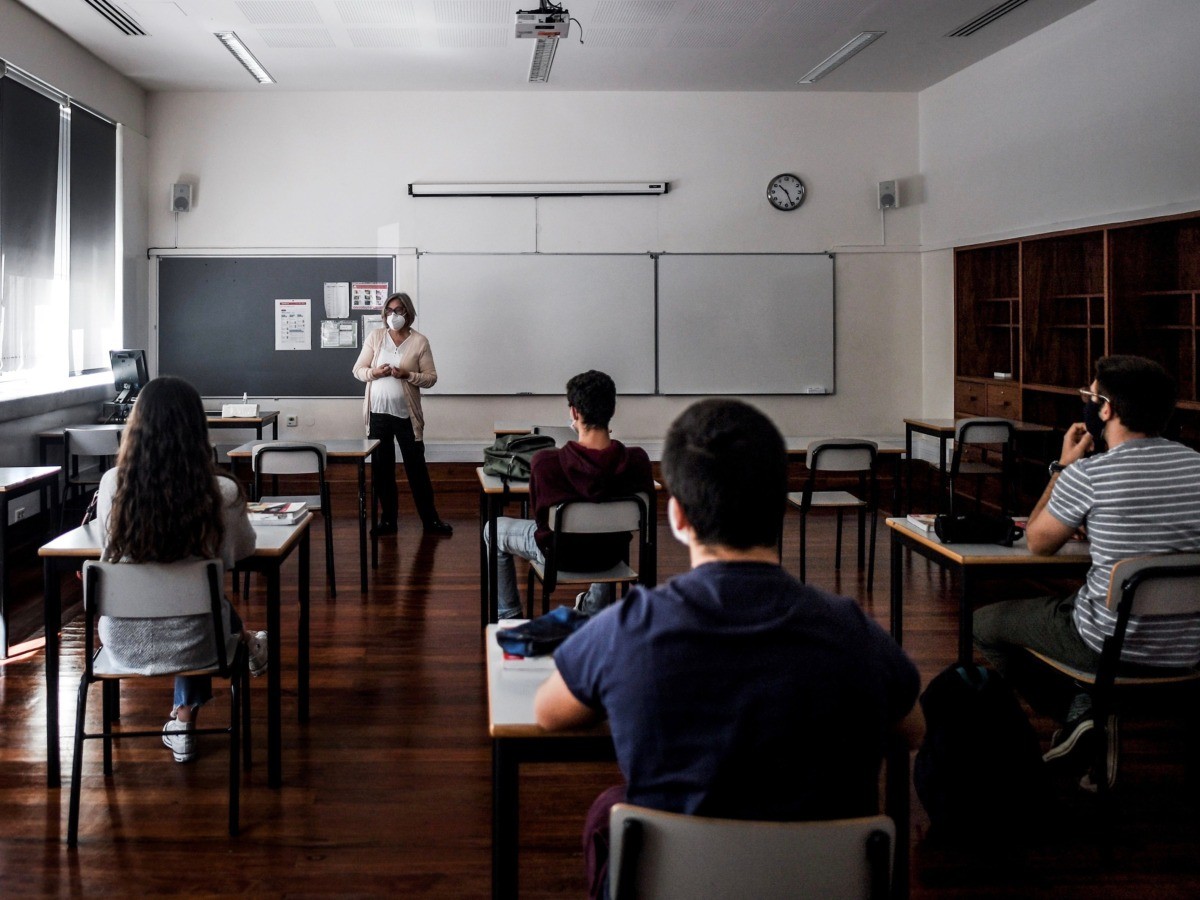
A teacher wearing a face mask gives a class on the first day of high school after the relief of emergency measures due to the COVID-19 outbreak at Filipa Lencastre high school in Lisbon on May 18, 2020. – The Portuguese government approved new measures starting today like the reopening of nurseries, high school classes and the reopening of some street shops, cafes, restaurants, museums, monuments and palaces. (Photo by PATRICIA DE MELO MOREIRA / AFP) (Photo by PATRICIA DE MELO MOREIRA/AFP via Getty Images)
Countries across Europe are desperate to open up their economies, with the European Union is facing a historic recession as a result of the lockdown measures introduced to stem the spread of the Chinese coronavirus.
Earlier this month the European Commission predicted that the bloc as a whole will face a 7.4 per cent loss in GDP in 2020 as a result of the pandemic.
“Both the depth of the recession and the strength of the recovery will be uneven, conditioned by the speed at which lockdowns can be lifted, the importance of services like tourism in each economy and by each country’s financial resources,” said the EU’s Commissioner for Economy, Paolo Gentiloni.
Countries like Italy, Greece, and Spain are expected to see 9 per cent declines in their economies, the Commission warned.
Follow Kurt on Twitter at @KurtZindulka
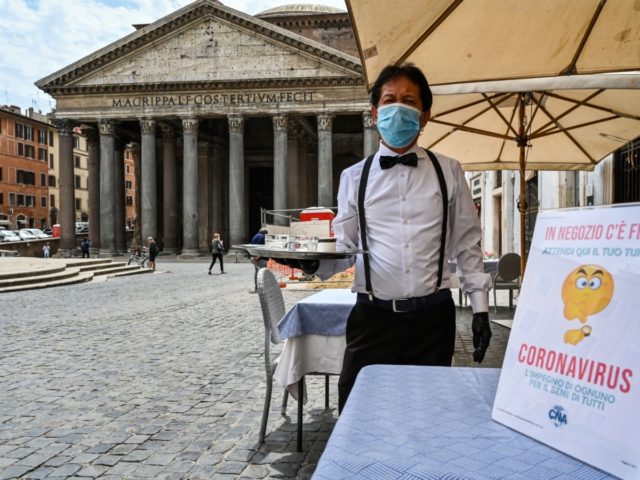
COMMENTS
Please let us know if you're having issues with commenting.